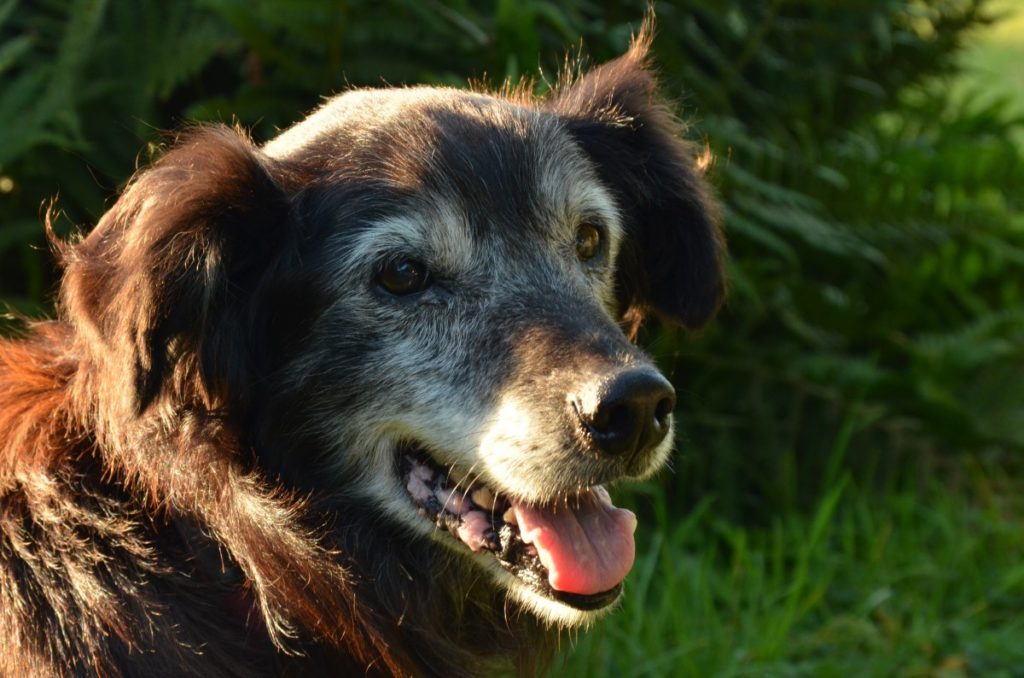Canine Cognitive Dysfunction

Like people, dogs are susceptible to the negative effects of aging on the mind and body. Canine cognitive dysfunction or “doggie dementia” is a disorder similar to dementia in people.
“Signs for canine cognitive dysfunction include problems with learning, housetraining, awareness of surroundings, and problems with the wake/sleep cycle,” said Dr. Joseph Mankin, clinical assistant professor at the Texas A&M College of Veterinary Medicine & Biomedical Sciences. “Dogs may also appear confused, have increased episodes of restlessness, and may have less interest in playing or appear irritable.”
Mankin says that cognitive dysfunction cases increase with age. About a third of dogs show one or more signs at the age of 11 and most dogs show signs of the dysfunction at the age of 16.
At this time, there is no breed predisposition. The only common indicating factor for dogs is the age.
If you feel your dog is showing signs of mind degeneration, visit with your veterinarian to learn more about possible diagnosis and treatment plans.
“The syndrome is diagnosed based on the patient’s clinical signs and activity/behavioral changes at home,” said Mankin. “There is not a specific test to diagnose the problem, although changes on advanced imaging of the brain can give some indication.”
“Treatment of cognitive dysfunction includes certain medications, environmental changes, and changes in diet,” explained Mankin. “With this syndrome, there may be an association with the lack of dopamine and there are medications that can increase dopamine activity that can help with a patient’s clinical signs.”
Diets high in antioxidants can also be beneficial for your pet’s treatment plan. Hills has a line of diet options.
Mankin recommends implementing increased activity among your dog to help slow the degenerative process.
“Environmental enrichment in the form of playing with toys, interacting with other dogs, and learning new tricks can be effective in lessening the signs of cognitive dysfunction,” added Mankin.
There are also no proven preventative measures that an owner can take. The best recommendations are to keep your dog healthy by giving it a balanced diet and continuing its exercise. Canine cognitive dysfunction is a function of the brain aging, and unfortunately most of the time it is inevitable.
It is important to remember that not all dogs will display all the signs of this dysfunction. That is why it is important to take your dog to your veterinarian if it displays any behavioral changes. Your veterinarian can look for common disorders that might explain what is going on with your pet.
“If your pet is starting to become confused, having accidents in the house, or displaying any behavioral changes, an appointment with your regular veterinarian would be indicated,” said Mankin. “There are several other disease processes that can start with similar clinical signs, so an exam and performing routine blood work is the first step in diagnosing the condition and ruling out other common causes.”
If initial test results do not explain the cause for your pet’s abnormal behavior, or if the results suggest additional information is required, the next step may be to see a specialist like Mankin. Your veterinarian can refer you to a veterinary neurologist whom can help determine what the problem is.
The natural aging process can be as painless as possible for your dog if you continue routine checkups with your veterinarian, and continue to be aware of your dog’s habits.
ABOUT PET TALK
Pet Talk is a service of the College of Veterinary Medicine & Biomedical Sciences, Texas A&M University. Stories can be viewed on the Web at vetmed.tamu.edu/news/pet-talk. Suggestions for future topics may be directed to editor@cvm.tamu.edu.


